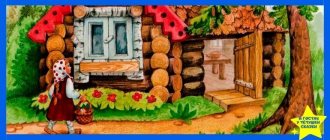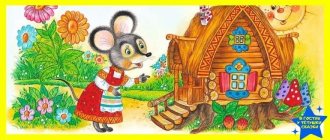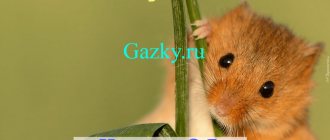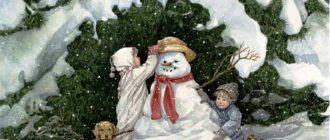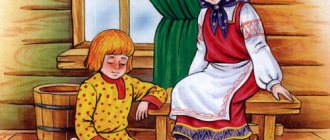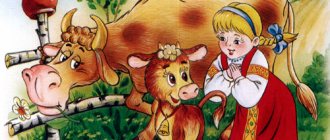The Russian folk tale Kolobok is one of the very first fairy tales in the life of every child. Kolobok was and remains the most famous fairy tale for children. On our website, parents will not only be able to read a fairy tale about Kolobok to their child, but also little listeners can listen to this story via audio, or even watch it on video. Colorful illustrations will make reading the fairy tale even more interesting and exciting.
Read the fairy tale Kolobok with pictures
Once upon a time there lived an old man and an old woman.
So the old man asks: “Bake me, old man, a bun.” - What should I bake it from? There is no flour. - Eh, old woman. Mark the barn, scratch the bottom of the tree, and you'll get it. The old woman did just that: she swept, scraped together two handfuls of flour, kneaded the dough with sour cream, rolled it into a bun, fried it in oil and laid it on the window to dry.
The bun got tired of lying - he rolled from the window to the bench, from the bench to the floor - and to the door, jumping over the threshold, into the entryway, from the entryway to the porch, from the porch to the yard, and then beyond the gate, further and further.
The bun is rolling along the road, and a hare meets it:
- Kolobok, Kolobok! I will eat you! - No, don’t eat me, scythe, but rather listen to what song I’ll sing for you. The hare raised his ears, and the bun began to sing: “I am a bun, a bun, swept across the barn, scraped along the knots, mixed with sour cream, planted in the oven, chilled at the window.” I left my grandfather, I left my grandmother, It’s not smart to leave you, hare. And the bun rolled on - only the hare saw it. A bun rolls along a path in the forest, and a gray wolf meets him:
- Kolobok, Kolobok! I will eat you! “Don’t eat me, gray wolf: I’ll sing you a song.” And the bun began to sing: “I am a bun, a bun, swept across the barn, scraped along the knots, mixed with sour cream, planted in the oven, chilled at the window.” I left my grandfather, I left my grandmother, I left the hare, It’s not smart to leave you, the wolf. And the bun rolled on - only the wolf saw it. The bun is rolling through the forest, and a bear comes towards it, breaking brushwood, bending bushes to the ground.
- Kolobok, Kolobok, I will eat you! - Well, where can you, clubfoot, eat me! Better listen to my song. The gingerbread man began to sing, and Misha's ears went wild: “I am a gingerbread man, a gingerbread man, swept across the barn, scraped through the knots, mixed with sour cream, planted in the oven, chilled at the window.” I left my grandfather, I left my grandmother, I left the hare, I left the wolf, It took me half a long time to leave you, bear. And the bun rolled - the bear just looked after it. The bun rolls, and a fox meets it:
- Hello, bun! How handsome and rosy you are! The gingerbread man is glad that he was praised, and began to sing his song, and the fox listens and creeps closer and closer: “I am a gingerbread man, a gingerbread man, swept across the barn, scraped along the knots, mixed with sour cream, planted in the stove, chilled at the window.” I left my grandfather, I left my grandmother, I left the hare, I left the wolf, I left the bear, It’s not smart to leave you, fox. - Nice song! - said the fox. “The trouble is, my dear, that I’ve become old—I can’t hear well.” Sit on my face and sing it one more time. Kolobok was delighted that his song was praised, jumped on the fox’s face and sang: “I am a Kolobok, a Kolobok... And his fox is a racket!” - and ate it.
Russian fairy tale
Children's fairy tale "Kolobok" about the eternal wheel of life
A child learns the Russian folk tale “Kolobok” even before he begins to learn to read. Parents use a children's book to tell their child about animals that may be encountered along the way if he suddenly decides to run away from home. The fairy tale is especially memorable when the grandmother reads it with expression at night; the impressions of the adventures of the main characters remain in the child’s memory for many, many years. As children grow up and learn about the changing seasons, the deep meaning of the old fairy tale can be explained to them. In kindergarten or school, teachers will be able to convey to the children what the people who came up with this funny and interesting story wanted to tell. In children's literature of different nations there are fairy tales similar to Kolobok. For example, among the British it is Johnny Donut, among the Irish it is Fat Flatbread, Pancake among the Scandinavians and the Gingerbread Man among the Germans. Why is this character found in books for children from completely different nations and who are the Hare, Wolf, Bear and Fox? To answer this question, let's take a closer look at them: Kolobok is the main character of an old fairy tale. This is unleavened bread baked from flour, butter and milk. The word “kolobok” is found in Greek and means wheat bread. The people who came up with the fascinating story imagined the red sun in the form of a Kolobok. A hot ball rolls across the sky all year round and gives all living things light, warmth and the joy of being. The hare is the first character that Kolobok met. It denotes winter, which begins every year. The wolf is the second character from whom Kolobok ran away. It represents spring, when the snow is melting, but nature is still gray and cold. The bear is the third character who wanted to eat the ruddy Kolobok. This is summer, generous and rich in food supplies. The Fox is the fourth character who managed to deceive and eat Kolobochka. She personifies the red autumn, when it is time to gather rich harvests, put them in barns and then feast on the reserves during the cold winter season. Grandfather and grandmother are the ancestors of all humanity, they love the warm sun very much and do not want it to run away. Kolobok is the hot sun that accompanies the change of seasons. The protagonist's journey means the eternal cycle of nature, and the old man and the old woman will bake Kolobok again and again so that life on Earth never ends.
Story with illustrations for family reading
A fairy tale with meaning will definitely appeal to all readers who look at the page. And photographs of bright nesting dolls, pictures and drawings will add liveliness to children's perception. Through unusual illustrations, children will get acquainted not only with the main characters of the fairy tale, but also learn about skilled craftsmen from the villages of Fedoskino, Mstera and Kholui. Large font text will help you quickly read the fairy tale and expand your vocabulary with the richness of your native Russian language. After reading, it is advisable to consolidate the impression and watch a fascinating hand-drawn cartoon or listen to a beautiful melodic audio fairy tale .
Fairy tale Kolobok
Read the fairy tale Kolobok with pictures online or download for free in pdf or docx formats. Russian folktale.
Download the fairy tale:
Fairy tale Kolobok read:
Once upon a time there lived an old man and an old woman. So the old man says to the old woman: “Come on, old woman, scratch the box, mark the bottom, see if you can scrape some flour into a bun.”
The old woman took the wing, scraped it along the box, swept it along the bottom and scraped up two handfuls of flour. She kneaded the flour with sour cream, made a bun, fried it in oil and put it on the window to cool.
The bun lay there, lay there, took it, and then rolled - from the window to the bench, from the bench to the floor, on the floor to the door, jumped over the threshold - and into the entryway, from the entryway to the porch, from the porch to the yard, from the yard through the gate, further and further.
Kolobok is rolling along the road, and the Hare meets him: “Kolobok, Kolobok, I’ll eat you!” - Don’t eat me, Hare, I’ll sing you a song:
| I am Kolobok, Kolobok, I am scraping the box, sweeping the bottom of the barrel, Meshon on sour cream, Yes, pryazhon in butter, Stuzhon on the window. I left my grandfather, I left my grandmother, I’ll leave you, the hare, even more so! |
And he rolled down the road - only the Hare saw him! Kolobok rolls, the Wolf meets him:
- Kolobok, Kolobok, I will eat you!
- Don’t eat me, Gray Wolf, I’ll sing you a song:
| I am Kolobok, Kolobok, I am scraping the box, sweeping the bottom of the barrel, Meshon on sour cream, Yes, pryazhon in butter, Stuzhon on the window. I left my grandfather, I left my grandmother, I left the hare, I’ll leave you, wolf, even more so! |
And he rolled down the road - only the Wolf saw him! Kolobok is rolling, the Bear meets him:
- Kolobok, Kolobok, I will eat you! - Where can you, clubfoot, eat me!
| I am Kolobok, Kolobok, I am scraping the box, sweeping the bottom of the barrel, Meshon on sour cream, Yes, pryazhon in butter, Stuzhon on the window. I left my grandfather, I left my grandmother, I left the hare, I left the wolf, I’ll leave you, bear, even more so! |
And he rolled again - only the Bear saw him! Kolobok rolls, the Fox meets him:
- Kolobok, Kolobok, where are you going?
- I'm rolling along the path.
- Kolobok, Kolobok, sing me a song!
Kolobok sang:
| I am Kolobok, Kolobok, I am scraping the box, sweeping the bottom of the barrel, Meshon on sour cream, Yes, pryazhon in butter, Stuzhon on the window. I left my grandfather, I left my grandmother, I left the hare, I left the wolf, I left the bear, It’s easy to leave you, fox! |
And Lisa says: “Oh, the song is good, but I can’t hear well.” Kolobok, Kolobok, sit on my toe and sing one more time, louder. Kolobok jumped up on the Fox's nose and sang the same song louder.
And the Fox told him again: “Kolobok, Kolobok, sit on my tongue and sing for the last time.” The bun jumped on the Fox's tongue, and the Fox made a noise! - and ate it. That's the end of the fairy tale, and whoever listened - well done!
- Tale of Sivka-Burka
- Tale of Geese and Swans
Powered by e-max.it, posizionamento sui motori
Fairy tales → Russian folk tales
Kolobok
To main
All authors
Home → Russian folk tales → Kolobok
Fairy tale “Kolobok” with illustrations by A. Medvedev, 1913
Once upon a time there lived an old man and an old woman.
So the old man asks:
- Bake me a bun for me, old lady.
- What should I bake it from? There is no flour.
- Eh, old woman. Mark the barn, scratch the branches - and you'll get it.
The old woman did just that: she swept, scraped together two handfuls of flour, kneaded the dough with sour cream, rolled it into a bun, fried it in oil and laid it on the window to dry.
The bun got tired of lying - he rolled from the window to the bench, from the bench to the floor - and to the door, jumping over the threshold, into the entryway, from the entryway to the porch, from the porch to the yard, and then beyond the gate, further and further.
The bun is rolling along the road, and a hare meets it:
- Kolobok, Kolobok! I will eat you!
- No, don’t eat me, scythe, but rather listen to what song I’ll sing for you.
The hare raised his ears, and the bun sang:
- I am a bun, a bun, swept across the barn, scraped along the knots, mixed with sour cream, planted in the oven, chilled at the window. I left my grandfather, I left my grandmother, It’s not smart to leave you, hare.
And the bun rolled on - only the hare saw it.
A bun rolls along a path in the forest, and a gray wolf meets him:
- Kolobok, Kolobok! I will eat you!
“Don’t eat me, gray wolf: I’ll sing you a song.” And the bun sang:
- I am a bun, a bun, swept across the barn, scraped along the knots, mixed with sour cream, planted in the oven, chilled at the window. I left my grandfather, I left my grandmother, I left the hare, It’s not smart to leave you, the wolf.
And the bun rolled on - only the wolf saw it.
The bun is rolling through the forest, and a bear comes towards it, breaking brushwood, bending bushes to the ground.
- Kolobok, Kolobok, I will eat you!
- Well, where can you, clubfoot, eat me! Better listen to my song.
The gingerbread man began to sing, and Misha’s ears went wild:
- I am a bun, a bun, swept across the barn, scraped along the knots, mixed with sour cream, planted in the oven, chilled at the window. I left my grandfather, I left my grandmother, I left the hare, I left the wolf, It took me half a long time to leave you, bear.
And the bun rolled - the bear just looked after it.
The bun is rolling, and the fox meets it: “Hello, bun!” How handsome and rosy you are!
Kolobok is glad that he was praised, and began to sing his song, and the fox listens and creeps closer and closer:
- I am a bun, a bun, swept across the barn, scraped along the knots, mixed with sour cream, planted in the oven, chilled at the window. I left my grandfather, I left my grandmother, I left the hare, I left the wolf, I left the bear, It’s not smart to leave you, fox.
- Nice song! - said the fox. “The trouble is, my dear, that I’ve become old—I can’t hear well.” Sit on my face and sing it one more time.
Kolobok was delighted that his song was praised, jumped on the fox’s face and sang:
- I am a bun, a bun...
And his fox is a racket! - and ate it.
Next →
Thank you for reading the fairy tale “Kolobok”!
Read all Russian folk tales To the main page (full list of works)
© “Online-Read.RF”, 2017-2022 Feedback
Origin of the word "Kolobok"
Kolobok is a diminutive of the word kolobok. In turn, kolob is a ball of dough rolled up, a small, round-shaped loaf of bread, a dumpling made from unleavened dough. A fluffy, round flatbread, produced in the form of a bread lump, often a ball or itself expanding into this shape at the end of baking. In the dialects of the Tver region there are the words: kolobukha - lump, dumpling; koloban, which means a thick cake, as well as the word okolobet meaning to shrink.
Some scholars believe that the word was borrowed from other languages, for example, it comes from the Greek kollabas, which means “wheat bread” or from the Swedish klabb meaning “chock”, “log”. There are also opinions about the Norwegian origin of the word from the noun klabb, translated meaning “whom”, or from other Scandinavian languages, for example, from kolfr (pole, beam). At times the word kolobok is correlated with the Latvian kalbaks, which means a hunk or crust of bread.
However, these versions of the origin of the word kolobok do not seem convincing due to the huge phonetic differences.
